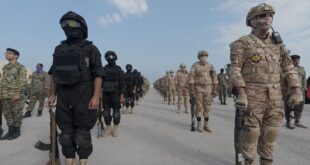JENIN — A few hundred fighters, a violent ideology and alleged funding from Iran — this lethal mix has turned Islamic Jihad into one of the biggest threats to the fragile Mideast truce.
Unlike its big brother Hamas, which is eyeing the Palestinian mainstream by seeking political office, Islamic Jihad has no such ambitions, and has launched attacks on Israel regardless of the Palestinian public’s longing for a respite from violence. The five-month-old truce is holding despite spikes in violence, largely because Hamas needs calm while it prepares to grab a share of power in Gaza after Israel withdraws from the territory this summer.
Islamic Jihad separated itself from the truce agreement just two weeks after it was declared in February, when a suicide bomber killed five Israelis outside a Tel Aviv nightclub. It said it was retaliating for an Israeli truce violation. Israeli troops began hunting the masterminds, setting the stage for more attacks by Islamic Jihad. The group carried out several attacks in June, including firing deadly rockets at a Jewish settlement in Gaza and killing an Israeli motorist in the West Bank. In early June, Israeli troops killed an Islamic Jihad commandeer in a firefight.
“Islamic Jihad has taken itself absolutely out of the agreement with its attacks, and so from our view, we are operating fully against them, as we did before,†said Lt. Col. Erez Winner, a senior Israeli commander in the West Bank.
Can Islamic Jihad drag Israel and the Palestinians back into full-blown fighting? Israeli and Palestinian analysts believe the answer is yes, if it so wishes.
Islamic Jihad has always been vague about its commitment to the truce.
“It is the right of the resistance to respond to any Israeli aggression, including arrests,†said Abdel Halim Izzedine, an Islamic Jihad leader released this spring after three years in an Israeli prison. “The occupation never stopped and the resistance never stopped,†he said in his office in the West Bank city of Jenin. “If they (Israelis) slow things down, we will slow things down. If they escalate, we will escalate.†Founded some 25 years ago, Islamic Jihad carried out several deadly attacks on Israelis in the mid-1980s. Hamas was founded soon after. The two have identical goals: destroying Israel and replacing it with an Islamic state.
However, Hamas also runs a social welfare system of schools, clinics and charities, and has done well in recent Palestinian elections against its larger rival, the ruling Fateh movement.
Islamic Jihad, meanwhile, remains relatively marginal. It is strongest in Gaza and Jenin, while its leaders are based mostly in Syria, though some also live in Lebanon and Egypt. Fateh and Hamas are expected to seek quiet during Israel’s Gaza withdrawal, presenting an opportunity for Islamic Jihad to flex its muscle with more attacks.
“They want to show that their capacity within the Palestinian arena is bigger than it is,†said Boaz Ganor, an Israeli counterterrorism expert. “They want to show they are more patriotic than any other organisation, and they would like to challenge the (Palestinian) regime.
Simply, they are against any other activity but violence.†Palestinian legislator Ziyad Abu Amr, who frequently mediates between Palestinian leader Mahmoud Abbas and the factions, said Islamic Jihad could bring down the truce “if it insists on retaliating and Israel persists in attacking.†“Eventually,†he said, “Hamas will be put in an embarrassing position and realise that it can’t just sit there with its hands tied while Islamic Jihad fights.†While Hamas is tightly organised, Islamic Jihad largely consists of small cells of fighters, who Israeli and American analysts say get funding and direction from Iran, one of Israel’s most implacable foes. Iranian-backed Hizbollah fighters in Lebanon serve as middlemen, contacting West Bank cells by phone and e-mail, say Islamic Jihad members.
Martiu Indyk, the US ambassador to Israel during the Clinton administration and now an analyst with a US think tank, said Islamic Jihad is an extension of the Iranian intelligence service. Whenever Hamas and other groups have tried to calm the situation, “Islamic Jihad stirred things up,†he told reporters in Jerusalem during a recent visit.
Adnan Khader, the group’s spokesman in the West Bank town of Ramallah, denies Islamic Jihad gets its orders from abroad.
“These are just excuses to target Iran, Syria, and Islamic Jihad,†he said. “All our decisions are made in Palestine.â€
 Eurasia Press & News
Eurasia Press & News



